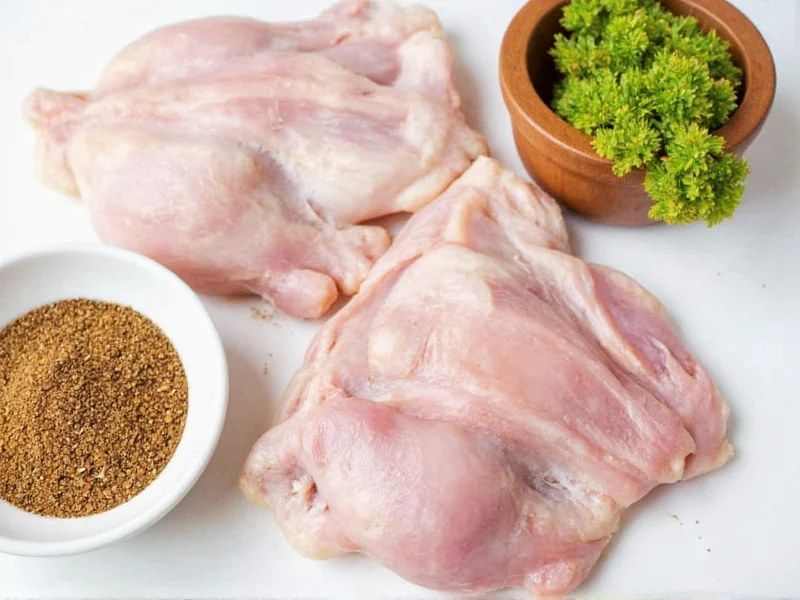When you're in the middle of preparing a holiday meal or weeknight dinner and realize you're out of poultry seasoning, don't panic. This versatile spice blend is actually a combination of common herbs you likely already have in your kitchen. Understanding what makes up poultry seasoning allows you to create effective substitutes that maintain the flavor integrity of your dishes without requiring a last-minute grocery run.
What Exactly Is Poultry Seasoning?
Poultry seasoning isn't a single herb but rather a carefully balanced blend typically featuring sage as the dominant flavor, complemented by thyme, rosemary, marjoram, black pepper, and sometimes nutmeg or allspice. Commercial blends may also include onion powder, celery seed, or red pepper flakes. The magic lies in the proportions—sage provides that distinctive earthy backbone while the supporting herbs add complexity without overwhelming the delicate flavor of poultry.
Why You Might Need a Substitute
Home cooks seek poultry seasoning alternatives for various reasons: running out before Thanksgiving dinner, dietary restrictions requiring specific herb omissions, preference for homemade blends without additives, or simply wanting to understand the components of this mysterious spice jar. Knowing reliable substitution methods transforms this potential cooking crisis into an opportunity for customization.
Creating the Perfect Homemade Poultry Seasoning
The most accurate poultry seasoning substitute recipe combines herbs in precise ratios that mirror commercial blends. This isn't just throwing random herbs together—it's about recreating that signature flavor profile that makes roast chicken, turkey, and stuffing taste complete.
| Herb | Amount for 1 Tbsp Blend | Flavor Contribution |
|---|---|---|
| Dried Sage | 1 tbsp | Earthy, slightly peppery foundation |
| Dried Thyme | 1½ tsp | Subtle lemon notes, aromatic complexity |
| Dried Rosemary | 1½ tsp | Pine-like fragrance, robust character |
| Dried Marjoram | ¼ tsp | Sweet, floral undertones |
| Black Pepper | ¼ tsp | Subtle heat, depth |
| Ground Nutmeg | ¼ tsp | Warm sweetness, traditional accent |
Quick Pantry Substitutes When Time Is Short
When you need an immediate poultry seasoning replacement without measuring multiple herbs, consider these practical alternatives based on what's available in your spice cabinet:
- Allspice substitute: Use 1½ teaspoons allspice for every tablespoon of poultry seasoning required. This works surprisingly well in gravies and stuffings where the warm, complex flavor profile complements poultry.
- Herbes de Provence alternative: Substitute equal parts herbes de Provence when making roasted chicken. The lavender content makes this better for lighter preparations than traditional turkey seasoning.
- Sage-only emergency fix: When nothing else is available, use 2 teaspoons dried sage per tablespoon of poultry seasoning. Add a pinch of black pepper if possible for better balance.
Specialized Substitutions for Specific Dishes
Not all poultry seasoning substitutes work equally well across different applications. Understanding which alternative performs best for your specific recipe ensures optimal results:
For Thanksgiving stuffing, the complete homemade blend works best as it provides the complex flavor layering that makes traditional stuffing memorable. If you're missing sage (perhaps due to dietary restrictions), replace it with an equal amount of savory, which has a similar earthy profile without the distinctive sage taste.
When making chicken soup or broth, consider using poultry seasoning made without nutmeg, as the sweet warmth can clash with the clean broth flavors. Increase the thyme slightly instead for better compatibility with soup preparations.
For roasted turkey, don't skip the nutmeg in your homemade blend—it's essential for that classic holiday flavor. The small amount won't make your turkey taste sweet but provides crucial aromatic complexity that balances the other herbs.
Adjusting Substitution Ratios for Best Results
Understanding poultry seasoning replacement ratios prevents your dish from becoming over-seasoned or bland. Most recipes call for 1-2 tablespoons of poultry seasoning per whole chicken or turkey. When substituting:
- For every 1 tablespoon commercial poultry seasoning, use 1 tablespoon of your homemade blend
- If using individual herbs separately in a recipe, multiply the amount by 1.5 (commercial blends are more concentrated)
- When substituting allspice, use only 75% of the required amount as it's more potent
Always taste your seasoning mixture before adding it to your main dish. The beauty of homemade substitutes is adjusting to your personal preference—some enjoy more rosemary, others prefer extra thyme. This customization is impossible with store-bought blends containing anti-caking agents and fillers.
Storage Tips for Homemade Blends
Create larger batches of your homemade poultry seasoning substitute and store it properly to always have it on hand. Place your blend in an airtight container away from light and heat. Properly stored, it maintains peak flavor for 4-6 months (compared to 2-3 months for commercial blends). For extended storage, freeze in ice cube trays covered with oil, then transfer to freezer bags—ideal for quick addition to soups and stews.
Common Questions About Poultry Seasoning Substitutes
Many home cooks have specific concerns when replacing poultry seasoning. Understanding these nuances helps achieve perfect results every time, whether you're preparing a simple weeknight chicken dish or elaborate holiday feast. The right substitution knowledge transforms potential cooking disasters into culinary successes.











 浙公网安备
33010002000092号
浙公网安备
33010002000092号 浙B2-20120091-4
浙B2-20120091-4